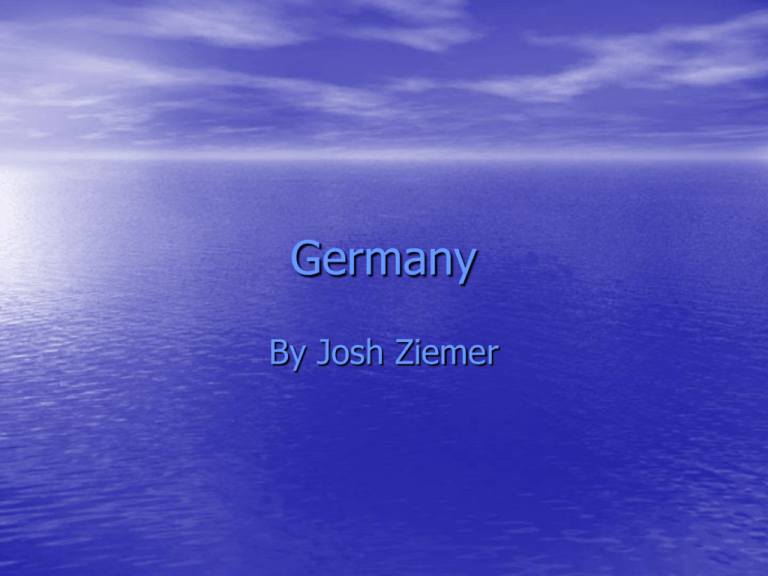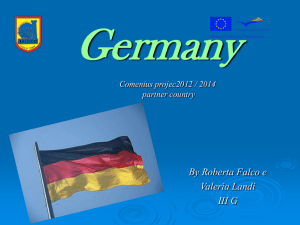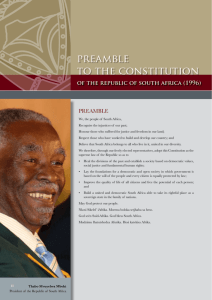Germany
advertisement

Germany By Josh Ziemer Background • As Europe's largest economy and most • populous nation, Germany remains a key member of the continent's economic, political, and defense organizations. European power struggles immersed the country in two devastating World Wars in the first half of the 20th century and left the country occupied by the victorious Allied powers of the US, UK, France, and the Soviet Union in 1945. With the advent of the Cold War, two German states were formed in 1949: the western Federal Republic of Germany (FRG) and the eastern German Democratic Republic (GDR). The end of the Cold War allowed for German unification in 1990. Background part two • Since then, Germany has expended considerable funds to bring eastern productivity and wages up to western standards. In January 2002, Germany and 11 other EU countries introduced a common European currency, the euro. Environment Problems • From coal-burning utilities and industries contribute to air pollution; acid rain, resulting from sulfur dioxide emissions, is damaging forests; pollution in the Baltic Sea from raw sewage and industrial effluents from rivers in eastern Germany; hazardous waste disposal; government established a mechanism for ending the use of nuclear power over the next 15 years. Germanys different names • conventional long form: Federal Republic of Germany conventional short form: Germany local short form: Deutschland former: German Empire, German Republic, German Reich. Leaders • One leader I am sure • • everyone has heard of is Hilter. But now Germanys leaders aren't crazy or insane anymore. Gherhard Schroeder is the prim minister of Germany right now and form what I have heard he is a good leader. Germen Food • Germany has a lot of great food. One of my favorites is the Germen Sausage. They have a lot of the same food we have here in America. Germany’s Army • Army, Navy (including • naval air arm), Air Force, Medical Corps, Joint Support Service. Only men are allowed to join the army not women. War • Germany always wanted the world and was willing to fight over it. Germany was involved with two major wars, the great war (World War I) and World War II. • They were involved in the cold war and other wars but world war l and ll were the biggest. Germany also was the country that was doing the Holocaust with the Jews. Germany has much war history but these were the biggest. The Flag • What the flag looks • like. Three equal horizontal bands of black (top), red, and gold Famous People • Some famous people in Germany are Gherhard Schroeder (prime minister). A lot of musicians were from there, some known as Beethoven, Mozart, and Bach. Johann Wolfgang Von Goethe and Friedrich Von Schiller they were poets. Climate • Temperature there is cool, cloudy, wet winters and summers; occasional warm, tropical wind; high relative humidity. Seasons • Germany is pretty • much the same as what we have here in Chicago. They have nice summers and cold winters They have some other things we do not. Longer summers and very nice spring and fall. History of Germany • One fact many people know about • • • Germany’s involvement in World War II. Also Hitler was living in Germany at the time of the war and caused World War II to happen. Germany was ruled under Kaisers who were emperors around the 1800s. Germany was divided by a giant wall (know as the Berlin Wall) Government • The government in Germany is called the federal republic. • Germany also has a executive branch, legislative branch, and judicial branch. • Political parties of Germany are Alliance '90/Greens, Christian Democratic Union or CDU, Christian Social Union or CSU, Free Democratic Party or FDP, Party of Democratic Socialism or PDS, Social Democratic Party or SPD. Airports • One of the airports there is called Deutsche Lufthansa. Berlin also has an airport with the name “Berlin”. Germany does not have as many airports as the US but it has enough for people to fly in and out. • They also serve good German food. • Germany has 551 airports. Attractions • One major attraction is the city of Renaissance. Founded in 15 BC under the rule of Emperor Augustus, Augsburg grew to become a major trading centre. The imperial city achieved its greatest prosperity in the 15th and 16th centuries as a result of international trade and the banking business of the Fugger and Welser merchants families. The magnificent Renaissance buildings that give the city its unique character date from this period. Population • The population of • Germany from July 2003 is 82,398,326. A lot more people are living there now. The population of Germany have more men (6,312,614) and women (5,988,681). Where is Germany? • Germany could be • • found in Central Europe, bordering the Baltic Sea and the North Sea, between the Netherlands and Poland, south of Denmark. Germany is a country that could not be missed. Germany is slightly smaller than Montana Communications • Main telephones • users are 50.9 million and cell phone users are 55.3. There are 32.1 million Internet users. Languages • The language they speak there is German. Some of them know English but they mainly speak German Where is Germany from the US • Germany is east from the US. • It is very far from us but we could get there by plane. Closing • In closing I find Germany interesting and fun. • One day I hope I get to go there and see all the • sites. That man up there is Mr. Plaza!





